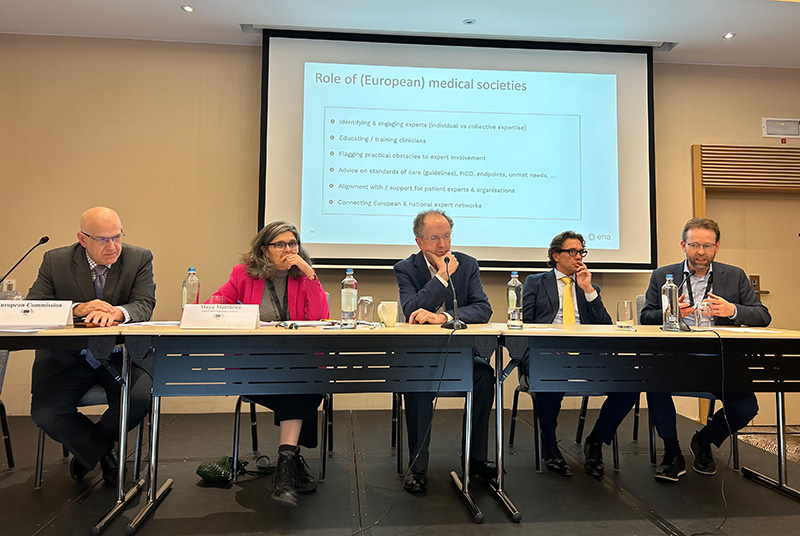This information originally appeared on the previous EHA website. Links to other pages may be inactive.

Access is at the heart of EHA's European Affairs work. More specifically, equitable and affordable access to innovative therapies that are of clear added benefit from a clinical, patient, and public health perspective. This is our main advocacy goal, along with improving the overall EU research and regulatory environments affecting the day-to-day work of hematologists and the quality of patient care.
Direct involvement of hematologists in the policy and decision-making processes that determine access is key to ensuring that the needs of hematologists and their patients are taken into account. EHA's experts are currently front and center in several important EU initiatives that will help improve conditions for, and patient access to, innovation in hematology.
Clinical trials
ACT EU ('Accelerating Clinical Trials in the European Union') is the platform where EU regulators (European Commission, European Medicines Agency and national agencies) and stakeholders collaborate to improve the EU environment for innovative clinical research. EHA is prominently involved as a member of the permanent Advisory Group of the ACT EU Multistakeholder Platform (MSP AG).
EHA has successfully led efforts to get 'Reducing Bureaucracy in Clinical Trials' high on the agenda. This campaign attracted much interest and support at a recent meeting of the EMA Health Care Professionals Working Party (Amsterdam, November 20) and at the European Cancer Summit (Brussels, November 21). We have also helped spearhead calls for more harmonization in how Member States implement the EU Clinical Trials Regulation and for stronger support for academic clinical research, funding for trials, and better regulatory facilitation of multinational and low-intervention trials. Quality, safety, efficiency, and unmet need are key focus areas in EHA's advocacy for better and more patient-centric designs and conduct of clinical trials.
HTA
EHA views the launch of joint relative clinical effectiveness assessments under the EU Regulation on Health Technology Assessment (HTA) (applicable for oncology and ATMPs from January 12, 2025) as a key step toward improving access to treatments with significant added benefit for patients and public health systems. The joint clinical assessments (JCA) aim to provide a better, more aligned evidence basis for national-level decision making on cost-effectiveness, pricing and reimbursement. For maximum uptake and impact, it is essential that the JCA benefit from the best available clinical expertise, to ensure that the joint assessment reports are of high quality and credibility.
EHA, in close collaboration with BioMed Alliance partners, has led positioning for European medical societies on HTA. At a meeting of the official HTA Stakeholder Network, on November 29, a joint presentation by EHA and the European Association of Urology on medical societies' role and added value in EU HTA met with a warm reception from the European Commission, the Member State Coordination Group on HTA (HTACG), and over 50 stakeholder organizations (including six patient organizations from the EHA Patient Advocacy Committee, or EHA PAC). There is increasing recognition that medical societies are indispensable for the identification and involvement of clinical experts, advice on standard of care and PICO (population, intervention, comparator, outcome) criteria, and consensus building across European and national expert networks.
EU cancer policies
On November 15, an EHA delegation headed by Prof Antonio Almeida, EHA President, and Prof Elizabeth Macintyre, Chair of the EHA European Affairs Committee, met with the Cancer Mission Board, the body of experts that identifies priorities for the Mission on Cancer in the Horizon Europe multiannual funding program. The Cancer Mission, key to the realization of the Europe's Beating Cancer Plan, focuses on the prevention and early detection of cancer, equal access to cancer diagnosis and treatment, and quality of life for cancer patients and survivors.
EHA called the Board's attention to four essential elements in the fight against cancer: harmonization of training, access to clinical trials, European clinical practice guidelines, and interaction with national authorities and scientific societies to stimulate the national implementation of EU cancer policies. The meeting marked important progress in improving the visibility and integration of hematology in EU cancer policies, with Mission Board members commenting on the distinctive nature of hematology as an integrated specialty that combines the clinical and the laboratory, both essential to improving access to cancer diagnosis and treatment.